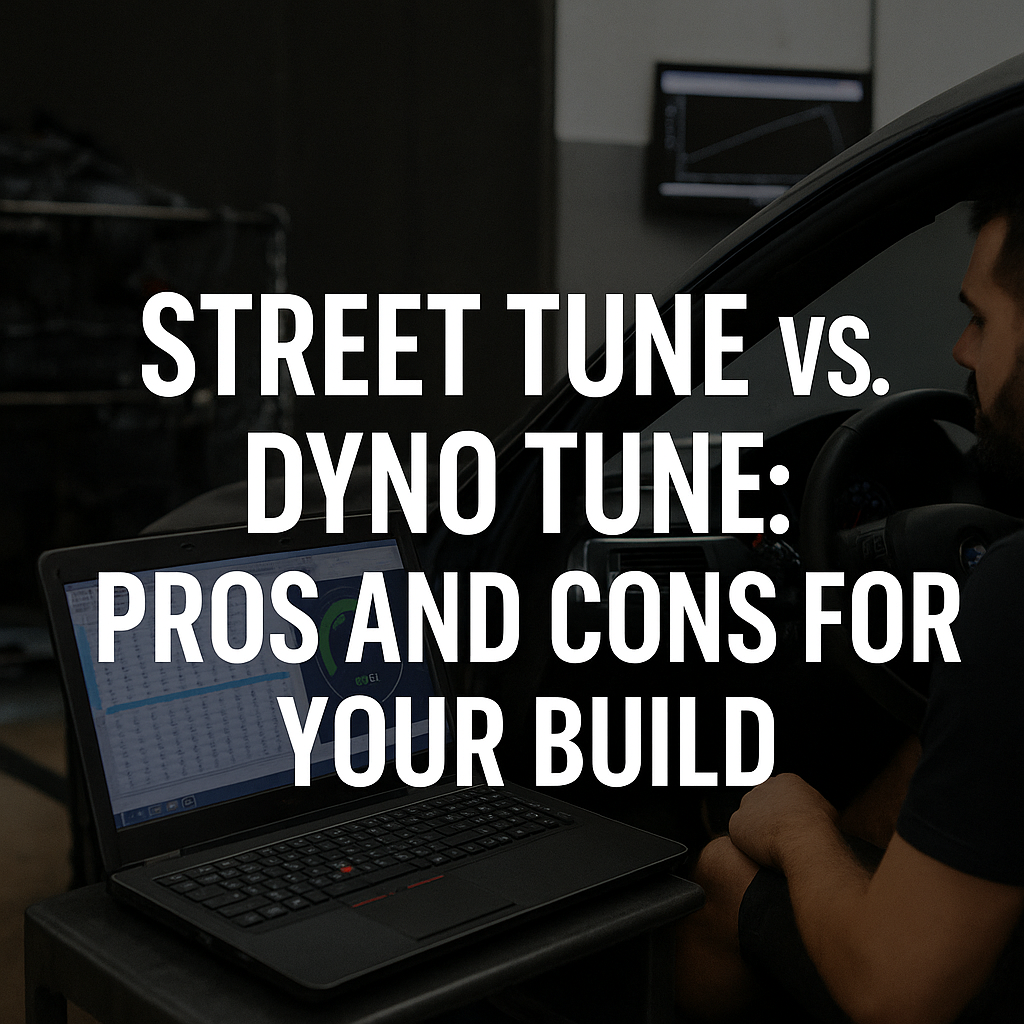
Street Tune vs. Dyno Tune: Pros and Cons for Your Build
What Is a Street Tune?
A street tune is a form of custom tuning performed while driving the vehicle in real-world conditions. The tuner collects data logs from a wide range of scenarios — low-speed cruising, part throttle, wide-open throttle pulls, deceleration, and more. This allows them to analyze how the engine behaves under varying loads, temperatures, and elevations — the same situations you’ll face during daily driving or spirited runs.
Using tools like Hondata, KTuner, Bootmod3, or HP Tuners, the tuner reviews these logs and modifies parameters such as fuel delivery, ignition timing, throttle response, and boost control. This iterative process continues until drivability is smooth, power delivery is clean, and AFR (air/fuel ratio) stays safe throughout the RPM range.
Advantages of a Street Tune:
-
✅ Real-World Testing: Your car is tuned under the same conditions it will be driven in. This can make a noticeable difference in throttle feel, shift transitions (for automatics or DCTs), and turbo response.
-
✅ Better Drivability: Tuners can optimize how your car behaves in traffic, through elevation changes, or stop-and-go situations.
-
✅ Cost-Effective: Since you're not renting time on a dyno, the cost is often lower. Great for simple bolt-on cars that don’t need max-effort calibration.
Disadvantages of a Street Tune:
-
❌ No Dyno Numbers: You won’t get a printed horsepower or torque graph, which may be a downside for customers who want to see hard numbers.
-
❌ Limited Safety Buffer: Street tuning doesn’t offer the same safety margin as a controlled dyno session. If the tune runs lean at WOT, you don’t get to shut it down as quickly.
-
❌ External Factors: Traffic, road surface, temperature swings, and elevation can affect consistency while tuning — making it harder to get perfect logs.

What Is a Dyno Tune?
A dyno tune is performed with the vehicle strapped to a chassis dynamometer. The dyno simulates real driving loads and measures power output at the wheels in a highly controlled environment. The tuner can apply various throttle positions, RPM sweeps, and load conditions while safely monitoring engine parameters without the unpredictability of public roads.
This process allows for precise tuning of AFR, ignition timing, boost pressure, cam phasing (if applicable), and throttle maps. You can also see how changes affect horsepower and torque in real time, which is especially important for fine-tuning high-output engines.
Advantages of a Dyno Tune:
-
✅ Accurate Power Readings: You get detailed graphs showing horsepower, torque, and AFR across the RPM range — ideal for diagnosing dips, spikes, or flat spots in power.
-
✅ Controlled Environment: No traffic, weather, or road conditions to affect results. This ensures clean, consistent data for tuning.
-
✅ Critical for Big Builds: For turbo swaps, flex fuel conversions, forged engine builds, and race setups, a dyno tune ensures you’re not pushing the limits blindly.
Disadvantages of a Dyno Tune:
-
❌ More Expensive: Dyno time is billed by the hour and can add significant cost to a tuning session.
-
❌ No Real-World Adaptation: You don’t get to test how the car reacts to stop-and-go traffic, elevation, or shifting weight dynamics on real roads.
-
❌ Potential Heat Soak: Some dynos don’t replicate real airflow, so vehicles may experience heat soak quicker than on the street, especially turbo cars.

Which Should You Choose?
The right tuning method depends entirely on your build, budget, and goals.
Choose a Street Tune if:
-
Your car has basic bolt-ons like an intake, exhaust, or upgraded intercooler
-
You’re looking for improved drivability and throttle response
-
You’re on a tighter budget and don’t need dyno power numbers
-
You want to optimize your daily or weekend driver without pushing the limit
Choose a Dyno Tune if:
-
Your car has a built motor, upgraded turbo, fuel system, or flex fuel kit
-
You’re chasing a specific power number
-
You want maximum control over every parameter
-
You need to confirm safe AFR, knock levels, and boost curves before hitting the street
Our Recommendation
At 5ive Performance, we offer both tuning options in-house. For street-driven bolt-on cars, our custom street tunes will give you the smoothest power delivery with real-world refinement. For higher horsepower or fully built setups, our dyno sessions ensure everything is dialed in with precision and safety in mind.
Need help deciding which route is best for your build? Contact us — we’ll match the right tuning service to your goals and walk you through the entire process.

Leave a comment
Your email address will not be published.